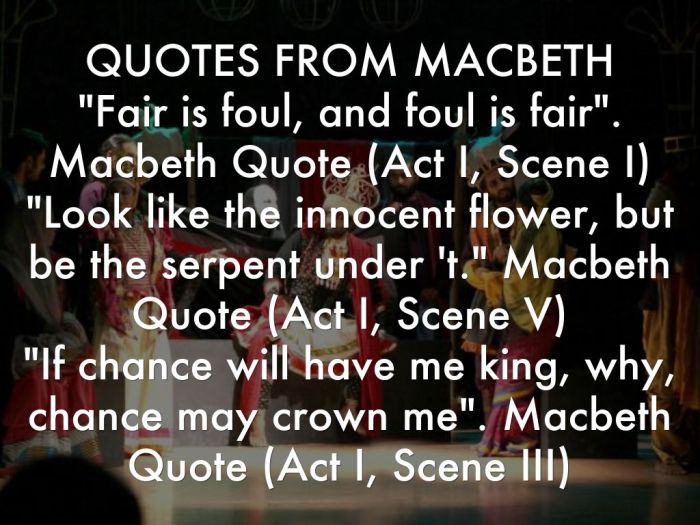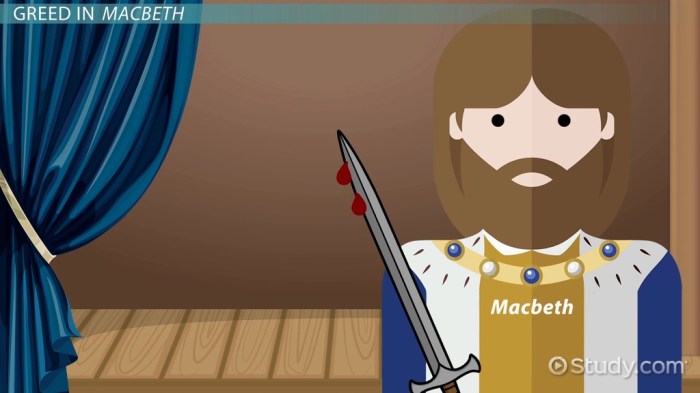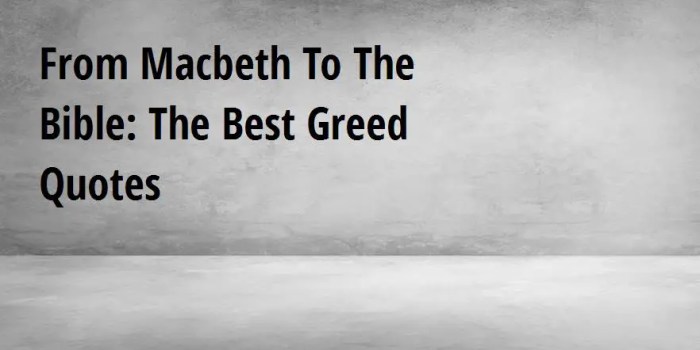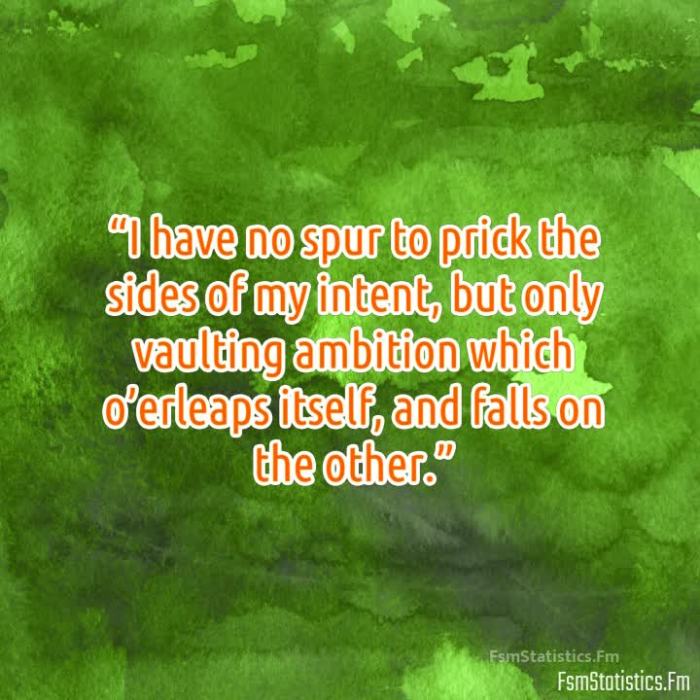Embarking on a journey into the depths of Shakespeare’s “Macbeth,” we delve into the captivating realm of greed, exploring its profound impact on the play’s characters and themes. Quotes of greed in Macbeth serve as a literary mirror, reflecting the destructive nature of this insatiable desire.
Macbeth’s relentless pursuit of power, fueled by an unquenchable thirst for more, provides a chilling testament to the corrosive effects of greed. Through his actions and words, we witness the transformative power of this vice, as it warps his morality and ultimately leads to his downfall.
Character Analysis of Macbeth

Greed plays a pivotal role in Macbeth’s tragic downfall, corrupting his character and leading him down a path of destruction.
Macbeth’s Greedy Actions and Consequences
Macbeth’s greed is first evident in his relentless pursuit of power. Driven by ambition, he murders King Duncan to seize the throne. This act of greed not only sets in motion a chain of violence but also alienates Macbeth from his own humanity.
Macbeth’s greed extends beyond his desire for power. He also exhibits avarice, accumulating wealth through unjust means. For instance, he orders the execution of Macduff’s family, motivated by the desire to eliminate potential threats to his throne.
Greed’s Corrupting Influence on Macbeth
Greed corrupts Macbeth’s character, transforming him from a noble warrior into a ruthless tyrant. As he indulges in his desires, he becomes increasingly paranoid and ruthless, sacrificing his morals and relationships in the pursuit of power and wealth.
Macbeth’s greed ultimately leads to his isolation and downfall. Haunted by guilt and suspicion, he loses the respect of his subjects and the love of his wife. His once-promising reign ends in tragedy, as he is defeated by Macduff and killed in battle.
Symbolism and Motifs of Greed

The play “Macbeth” is replete with symbols and motifs that embody the theme of greed. These elements provide profound insights into the destructive nature of unchecked ambition and the corrosive effects of avarice on the human soul.
The Witches’ Prophecies
The witches’ prophecies play a pivotal role in fueling Macbeth’s greed. Their initial prediction that he will become Thane of Cawdor and King of Scotland ignites his ambition, setting him on a path of ruthless violence and treachery.
The witches’ subsequent prophecy that he will be “safe till by a man from woman born” and “none of woman born” shall harm him gives Macbeth a false sense of invincibility, leading him to underestimate his enemies and overreach in his pursuit of power.
Literary Devices and Techniques

Shakespeare employs a plethora of literary devices to convey the theme of greed and enhance its portrayal in Macbeth. These devices include foreshadowing, irony, and vivid imagery, which work together to create a rich and nuanced exploration of this destructive vice.
The play Macbeth is full of memorable quotes about greed, a theme that is explored in great detail throughout the play. One such quote is, “I have no spur to prick the sides of my intent, but only vaulting ambition, which o’erleaps itself and falls on the other.”
This quote shows how greed can lead to downfall, as Macbeth’s ambition to become king ultimately leads to his destruction. In the poem vida poema de amado nervo , the author also explores the theme of greed, showing how it can corrupt the soul and lead to destruction.
Foreshadowing
Foreshadowing is used throughout the play to hint at the tragic consequences of Macbeth’s greed. For instance, the witches’ prophecies in Act I foreshadow his rise to power but also his eventual downfall. In Act III, the ghost of Banquo appears at the banquet, foreshadowing Macbeth’s guilt and paranoia.
Irony
Irony is another powerful device used to highlight the absurdity and self-destructiveness of greed. For example, Macbeth’s desire for power leads him to commit heinous crimes, but his actions ultimately lead to his own destruction. Similarly, Lady Macbeth’s ambition for her husband drives her to madness and death.
Imagery
Shakespeare’s use of vivid imagery creates a visceral representation of greed and its corrosive effects. Images of blood, darkness, and disease are frequently used to evoke the destructive nature of this vice. For instance, in Act V, Macbeth describes himself as “a butcher” with “hands … all gory,” reflecting the bloody consequences of his greed.
Language
Shakespeare’s skillful use of language enhances the portrayal of greed by creating a sense of urgency and desperation. The use of short, choppy sentences and exclamations conveys the characters’ intense emotions and the rapid pace of the action. For example, Macbeth’s famous line “Is this a dagger which I see before me?” captures his moment of hesitation and inner turmoil as he contemplates murdering Duncan.
Historical and Cultural Context

During the Elizabethan era, when Shakespeare wrote Macbeth, greed was a pervasive vice. The rapid economic expansion and social mobility of the time created a fertile environment for unchecked ambition and the pursuit of wealth.
Elizabethan society placed great emphasis on hierarchy and social order. Greed was seen as a threat to this order, as it could lead to social unrest and the breakdown of traditional values. Religious beliefs also condemned greed as a sin, equating it with idolatry and the worship of material possessions.
Shakespeare’s Influence
Shakespeare’s portrayal of greed in Macbeth reflects the Elizabethan worldview. The play explores the destructive consequences of unchecked ambition and the corrosive effects of greed on the human soul. Macbeth’s descent into tyranny is a cautionary tale about the dangers of allowing greed to consume one’s life.
Modern Relevance
The themes of greed and ambition explored in Macbeth continue to resonate with modern audiences. In a world driven by consumerism and the pursuit of wealth, Shakespeare’s play offers a timeless warning about the corrosive effects of greed and the importance of resisting its temptations.
Critical Reception and Analysis: Quotes Of Greed In Macbeth

Macbeth’s exploration of greed has garnered significant critical attention, with scholars offering diverse interpretations and perspectives on its enduring relevance and impact.
Critical Reception
The play’s portrayal of greed as a destructive force that corrupts individuals and society has been widely acclaimed. Critics have praised Shakespeare’s ability to craft characters whose motivations are driven by insatiable desires, leading them down a path of self-destruction.
Different Interpretations
- Marxist interpretations:Analyze the play as a critique of capitalism and the corrupting influence of wealth and power.
- Psychoanalytic interpretations:Explore the psychological motivations of Macbeth and Lady Macbeth, examining their repressed desires and subconscious drives.
- Feminist interpretations:Examine the gendered aspects of greed, highlighting the ways in which women are both victims and perpetrators of its destructive effects.
Enduring Impact, Quotes of greed in macbeth
Macbeth’s exploration of greed continues to resonate with contemporary audiences, offering insights into the dangers of unchecked ambition and the corrosive effects of materialism. The play’s enduring impact is evident in its continued relevance to literary criticism and its frequent adaptations for stage, screen, and other artistic mediums.
FAQs
What is the significance of the witches’ prophecies in relation to greed?
The witches’ prophecies play a crucial role in Macbeth’s downfall, fueling his ambition and ultimately leading him down a path of destruction. Their words sow the seeds of greed in his heart, tempting him with visions of power and grandeur.
How does Shakespeare’s use of language enhance the portrayal of greed?
Shakespeare employs vivid imagery, metaphors, and foreshadowing to create a rich and nuanced portrayal of greed. Through Macbeth’s soliloquies and interactions with other characters, we gain insight into the psychological and emotional toll that greed takes on the human soul.
What is the enduring message about greed conveyed in “Macbeth”?
“Macbeth” serves as a timeless cautionary tale about the destructive nature of greed. It warns against the perils of unchecked ambition and the corrosive effects of unbridled desire, leaving a lasting message that resonates with audiences across generations.